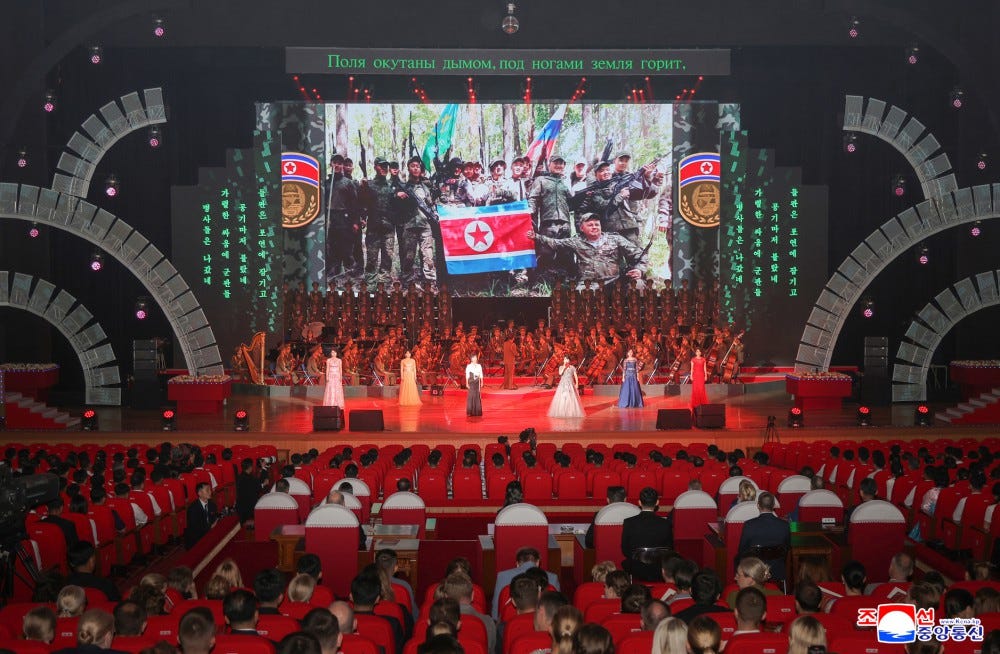Russia and North Korea’s Comprehensive Strategic Partnership at One Year — a Conversation with Troy Stangarone
Co-Chair of the North Korea Economic Forum at George Washington University, Troy Stangarone, joins OPFOR Journal to discuss the future of the strategic partnership between North Korea and Russia.
On June 29, Russian Minister of Culture Olga Lyubimova made her way to Pyongyang to commemorate the anniversary of the comprehensive strategic partnership treaty between Russia and North Korea. This marked the second high-level Russian visit to North Korea in less than two weeks, following Security Council Secretary Sergei Shoigu's meeting with Kim Jong-un (his second journey to the country in June alone) to explore enhanced cooperation between the two allies.

This week Troy Stangarone, Co-Chair of the North Korea Economic Forum and former Director of the Korea Center at the Wilson Center joins OPFOR Journal’s Dan White to discuss the current state of the cooperation between Russia and North Korea, and what the future holds for their strategic partnership.

OVERVIEW:
Dan White:
In June 2024 Russia and North Korea signed a treaty of comprehensive strategic partnership. It has turned out to be a substantive agreement. In the last year North Korea has provided significant military aid to Russia, including ammunition and combat troops. The exact numbers are constantly changing but can you give us a sense of how significant this assistance has been?
Troy Stangarone:
It's fair to say that North Korea has played a substantial role in Russia’s war against Ukraine. Based on released intelligence estimates, North Korea has provided Russia with more than 9 million rounds of artillery. The war has over the last year moved away from artillery to drones being the primary tool for attacking targets, but at the time that North Korea was providing the vast majority of its artillery, those supplies were the primary reason Russia held an artillery advantage over Ukraine that allowed them to advance deeper into Ukrainian territory. While we can debate the quality of North Korean artillery, the sheer volume of supplies that North Korea was able to provide played a significant role in the war.
In addition to artillery, North Korea has also provided Russia with 150 ballistic missiles similar to Russia’s Iskandar-M. Reports have suggested that North Korea could provide Russia with an additional 150 ballistic missiles this year. North Korea is also believed to have provided anti-tank missiles and light arms to Russia as well.
Beyond military equipment, North Korea has provided 14,000 troops to assist Russia in retaking the Kursk region and is expected to send additional troops in the near future to help reduce Russia’s need to recruit additional troops domestically.

BIGGER PICTURE:
Dan White:
There is a lot of speculation about what Kim Jong-un ultimately hopes to gain by thrusting so much human capital and military hardware into a war far from North Korean borders. What do you believe Kim’s endgame is here?
Troy Stangarone:
There are two objectives for Kim Jong-un in supporting Russia’s war.
The first is to weaken and break free of the constraints of international sanctions. This began with the breakdown of talks with the United States during the first Trump administration at the Hanoi summit. Afterwards, both Russia and China relaxed sanctions enforcement. To support its war, Russia has been willing to engage in clear and direct sanctions violations and actively supported North Korean efforts to undermine the international sanctions regime. The more North Korea can use the war to undermine the sanctions regime and improve its access to international currency and technologies the less pressure the United States and other parties will be able to put on the regime.
The second is a degree of military modernization. A combination of sanctions and neglect as the regime pursued nuclear weapons have left North Korea’s conventional forces outdated. Russia has been willing to transfer military technology in a way that no country has in decades.

Dan White:
What does the intensifying cooperation between North Korea and Russia mean for South Korea? There have been numerous reports suggesting that Russia has transferred old, but nevertheless more advanced, technology to North Korea for its air force and navy. Still, South Korea retains a pragmatic relationship with Russia, has avoided directly providing military aid to Ukraine, and decided to skip this year’s NATO summit. What is behind this strategy and what are the redlines for South Korea on Russia’s dealings with the North?
Troy Stangarone:
I wouldn’t read too much into skipping the NATO summit, as the leaders of the other Indo-Pacific Four (IP4) states did as well.1
South Korean officials under the previous Yoon administration tried to play a lower key role in supporting Ukraine to not alienate Russia. The belief was that Russia is needed to bring North Korea back to the negotiating table over its nuclear program, but this is likely an unrealistic hope. Russia vetoed the renewal of the UN Panel of Experts mandate to cover up its own sanctions violations with North Korea and Putin himself has said that North Korea will never give up the program.
South Korea also has economic interests in Russia that it is likely trying to protect for when sanctions are lifted after the war.
IMPLICATIONS:
Dan White:
Another critical open question about North Korea’s support to Russia’s war effort seems to be whether North Korean troops will fight in Ukraine proper. So far North Korea troops have fought Ukrainian troops in Russia’s Kursk region. But things might change. South Korea’s National Intelligence Service believes that another deployment of North Korean combat troops is likely to arrive in July or August. Russia has now mostly retaken Kursk with North Korean assistance. So it seems possible that these troops could be used to support Russian offensives elsewhere.
From Pyongyang's strategic perspective, would fighting on Ukrainian territory represent a major policy shift, or simply an extension of its current military commitment to Russia? Russia claims the annexed territories as its own anyway.
Troy Stangarone:
Until recently, North Korea and Russia have kept to the text of the agreement that each party is obligated to come to the other’s aid should it face an armed invasion. By only using North Korean troops in the Ukrainian occupied region of Kursk, Russia and North Korea could maintain the pretense that North Korea was only fulfilling its obligation to defend an ally under invasion.
If new reporting by CNN is accurate, North Korea is about to send an additional 25,000-30,000 troops to Russia. Not only will this be a significant jump from the current estimated 14,000 or so troops that are deployed to Russia, but the reporting also suggests that these new troops may take part in Russian occupied parts of Ukraine. This would be a significant escalation in North Korea’s role in the war as it transitioned from defending an ally to actively taking part in the invasion of a UN member state.
North Korean troops filmed attempting to storm Ukrainian positions in Kursk in December 2024 and setting their dead on fire to avoid recognition. Source: President Volodymyr Zelensky Official (@V_Zelenskiy_official) on Telegram, December 16, 2024
Dan White:
While Russia and North Korea were celebrating the first anniversary of their comprehensive strategic partnership, Russia’s newest comprehensive strategic partner, Iran, was getting bombed by Israel and the US. Putin notably distanced himself from any obligation to support Iran militarily, despite Iran being the first nation to provide significant military assistance to Russia in 2022.
What do you think North Korea has taken away from this situation? Do North Korean leaders feel concerned that Russia is an unreliable ally or did they go into this relationship with their eyes wide open and no expectation that Russia would ride to their rescue if they needed it?
Troy Stangarone:
North Korea has long taken a realist approach to regime security. During the Cold War it never truly trusted the Soviet Union or China and played both off each other. It was abandoned by Russia and China at the end of the Cold War. It is unlikely that Pyongyang entered into the comprehensive strategic partnership with any sense that Moscow would be a reliable ally in a crisis. The ease with which Russia has distanced itself from Iran and the former Syrian regime will only have reinforced those instincts. At the same time, continuing the relationship and maximizing the returns on support for Russia’s war remain in Pyongyang’s interest and the deeper North Korea can become enmeshed in the war the more it can demand from Russia in return.
Dan White:
Thank you Troy!
To read more from Troy on North Korea’s evolving partnership with Russia, check out the articles listed below.
“Why Russia-North Korea ties will survive Ukraine war” Korea Times, March 18, 2025
“Time to rethink North Korea-Russia relations” Korea Times, August 13, 2024
“Talks With North Korea Will be Troublesome for Trump” The Diplomat, November 7, 2024
The Indo-Pacific Four are NATO partner nations: Japan, South Korea, Australia, and New Zealand.





Such a compelling dialogue, Dan! Looking forward to more interviews like this.